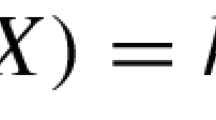Abstract
For an integer \(n\ge 2\), Ramsey Choice\(\mathsf {RC}_{n}\) is the weak choice principle “every infinite setxhas an infinite subset y such that\([y]^{n}\) (the set of alln-element subsets of y) has a choice function”, and \(\mathsf {C}_{n}^{-}\) is the weak choice principle “every infinite family of n-element sets has an infinite subfamily with a choice function”. In 1995, Montenegro showed that for \(n=2,3,4\), \(\mathsf {RC}_{n}\rightarrow \mathsf {C}_{n}^{-}\). However, the question of whether or not \(\mathsf {RC}_{n}\rightarrow \mathsf {C}_{n}^{-}\) for \(n\ge 5\) is still open. In general, for distinct \(m,n\ge 2\), not even the status of “\(\mathsf {RC}_{n}\rightarrow \mathsf {C}_{m}^{-}\)” or “\(\mathsf {RC}_{n}\rightarrow \mathsf {RC}_{m}\)” is known. In this paper, we provide partial answers to the above open problems and among other results, we establish the following:
-
1.
For every integer \(n\ge 2\), if \(\mathsf {RC}_{i}\) is true for all integers i with \(2\le i\le n\), then \(\mathsf {C}_{i}^{-}\) is true for all integers i with \(2\le i\le n\).
-
2.
If \(m,n\ge 2\) are any integers such that for some prime p we have \(p\not \mid m\) and \(p\mid n\), then in \(\mathsf {ZF}\): \(\mathsf {RC}_{m}\nrightarrow \mathsf {RC}_{n}\) and \(\mathsf {RC}_{m}\nrightarrow \mathsf {C}_{n}^{-}\).
-
3.
For \(n=2,3\), \(\mathsf {RC}_{5}\)\(+\)\(\mathsf {C}_{n}^{-}\) implies \(\mathsf {C}_{5}^{-}\), and \(\mathsf {RC}_{5}\) implies neither \(\mathsf {C}_{2}^{-}\) nor \(\mathsf {C}_{3}^{-}\) in \(\mathsf {ZF}\).
-
4.
For every integer \(k\ge 2\), \(\mathsf {RC}_{2k}\) implies “every infinite linearly orderable family of k-element sets has a partial Kinna–Wagner selection function” and the latter implication is not reversible in \(\mathsf {ZF}\) (for any \(k\in \omega \backslash \{0,1\}\)). In particular, \(\mathsf {RC}_{6}\) strictly implies “every infinite linearly orderable family of 3-element sets has a partial choice function”.
-
5.
The Chain-AntiChain Principle (“every infinite partially ordered set has either an infinite chain or an infinite anti-chain”) implies neither \(\mathsf {RC}_{n}\) nor \(\mathsf {C}_{n}^{-}\) in \(\mathsf {ZF}\), for every integer \(n\ge 2\).
Similar content being viewed by others
References
Blass, A.: Ramsey’s theorem in the hierarchy of choice principles. J. Symbolic Logic 42, 387–390 (1977)
Halbeisen, L.J.: Combinatorial Set Theory: with a Gentle Introduction to Forcing. Springer Monographs in Mathematics, Revised and Extended 2 edn. Springer, London (2017)
Howard, P.E.: Binary consistent choice on pairs and a generalization of König’s infinity lemma. Fund. Math. 121, 17–23 (1984)
Howard, P., Rubin, J.E.: Consequences of the Axiom of Choice, Mathematical Surveys and Monographs, 59. American Mathematical Society, Providence (1998)
Jech, T.J.: The Axiom of Choice, Studies in Logic and the Foundations of Mathematics, 75. North-Holland, Amsterdam (1973)
Kleinberg, E.M.: The independence of Ramsey’s theorem. J. Symbolic Logic 34, 205–206 (1969)
Montenegro, C.H.: Weak versions of the axiom of choice forfamilies of finite sets, in Models, algebras, and proofs,Selected papers of the X Latin American symposium onmathematical logic held in Bogotá, Colombia, June 24–29, 1995 (X. Caicedo and C. Montenegro, eds.), [Lecture Notes in Pure andApplied Mathematics 203], Marcel Dekker, New York \(\cdot \) Basel, pp. 57–60 (1999)
Pincus, D.: Zermelo-Fraenkel consistency results by Fraenkel-Mostowski methods. J. Symbolic Logic 37, 721–743 (1972)
Tachtsis, E.: On Ramsey’s Theorem and the existence of infinite chains or infinite anti-chains in infinite posets. J. Symbolic Logic 81(01), 384–394 (2016)
Tachtsis, E.: On variants of the principle of consistent choices, the minimal cover property and the \(2\)-compactness of generalized Cantor cubes. Topol. Appl. 219, 122–140 (2017)
Truss, J.: Finite axioms of choice. Ann. Math. Logic 6, 147–176 (1973)
Truss, J.: Classes of Dedekind finite cardinals. Fund. Math. 84, 187–208 (1974)
Acknowledgements
We would like to thank the anonymous referee for various comments and suggestions which substantially improved both the mathematical quality and the exposition of this paper.
Author information
Authors and Affiliations
Corresponding author
Additional information
Publisher's Note
Springer Nature remains neutral with regard to jurisdictional claims in published maps and institutional affiliations.
Rights and permissions
About this article
Cite this article
Halbeisen, L., Tachtsis, E. On Ramsey choice and partial choice for infinite families of n-element sets. Arch. Math. Logic 59, 583–606 (2020). https://doi.org/10.1007/s00153-019-00705-7
Received:
Accepted:
Published:
Issue Date:
DOI: https://doi.org/10.1007/s00153-019-00705-7
Keywords
- Axiom of Choice
- Weak forms of the Axiom of Choice
- Ramsey Choice
- Partial Choice for infinite families of n-element sets
- Ramsey’s Theorem
- Chain-AntiChain Principle
- Fraenkel–Mostowski permutation models of \(\mathsf {ZFA}+\lnot \mathsf {AC}\)
- Pincus’ Transfer Theorems




